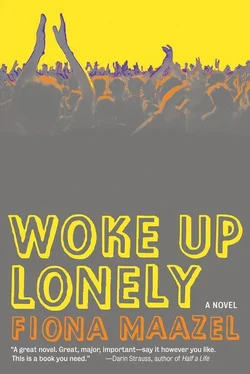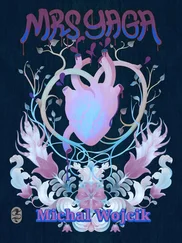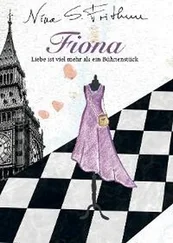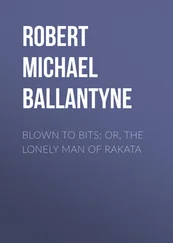Fiona Maazel
Woke Up Lonely
FOR CALYPSO
AND IN LOVING MEMORY OF
MY STEPDAD, PAUL
I. In which a cult leader does his thing. A bad idea gets its start. A sighting, a fat suit, the blues. In which no one is happy but everyone tries
THEY WERE TOGETHER. In their way. Dad on a bus, gaping out the window at a little girl and her mom. The pair not five feet away. He swiped the glass with his palm. Stop the bus, he said, though no one heard him. Stop the bus. His wife and daughter tromped through the snow. His wife? His ex-wife, bundled in down, soldiering on. His daughter, whom he had not seen in nine of her ten years. She jumped a puddle of slush. Wore a hat with braided tassels. He told himself to get up. Get up, Thurlow. But he couldn’t. He was stuck being someone else. A man to whom life had become a matter of seconds, to whom a bus was the universe, and the instinct to watch, all that there was to being in love.
Ida yanked her tassels like she was tolling the bells. Esme kept eyes on her footing. The bus stalled in traffic. Thurlow willed his wife — his ex-wife — to turn his way. If she could just see his face. He squinted and winced as if to enlist those muscles in the recruitment of her attention. She said something to their daughter and then, poof —she looked right at him. At her ex-husband. Thurlow had many epithets of notoriety, but this was his least known. Ex-husband. How about: Cult leader. Fanatic. Terrorist. On a bus in D.C., staring her down with those eyes. Not the pellucid blue of men who compel for being unreachable, but the crepuscular blue of day into night, a transition as reliable as it is fleeting and, for these twin qualities, emblematic of the thing you’d love all your life. She was rooted to the ice like he’d staked her there. Her heart was like corn in the popper.
He put up his hand to wave and then to knock on the glass and then to pound on the glass, when she grabbed their daughter’s arm and began to run away.
No, no, don’t do that. Don’t run. Why are you running? He’d seen what he had seen. Esme’s face registering its thoughts up front, as if she’d forgotten all her training, forgotten how to lie and conceal. Forgotten, even, how to vanish successfully. A few years ago, he’d gotten word they were living in the U.S., but with no way to track them — God knew which government agency was protecting Esme now — he’d accepted the news like a guy at the peep show, minus the part where you get to look. After that, he heard they were in Tucson. Portland. Detroit. Every year a new city. But now: a sighting. And not just a sighting but a reason to live. Because what he’d seen in her face? It wasn’t all dread and loathing, which were vestigial, anyway, but rather a vacancy where some other feeling could bed down.
At last, the bus came to its stop. Thurlow pushed his way out and climbed a bench. It was just past eight in the morning. The sidewalk was packed; Esme must have been taking Ida to school. Think, think. How many elementary schools could there be around here? He was about to ask someone for directions when he remembered himself. He’d left his hotel on foot. Broken about four other rules that were especially paramount now: never take public transportation, never carry ID, always use the driver, never be alone. He bought a baseball cap and sunglasses from a gift store. Stopped the first person he saw, who said, “Sorry, not today, pal,” because the cap was pink and sequined and the glasses were opaque, as for a blind man. Someone else said there wasn’t any school within twenty blocks.
Thurlow spun around. The good news was, he had narrowed the terrain of his loss to one city, when before it had encompassed them all. The bad news? Just because you know where your arm is broken doesn’t mean you know how to fix it. Even if he found them, what would he say? Character is fate, my name is Legion, but love me, anyway? He’d been running his organization for ten years, and it was huge. The Helix, a therapeutic community he’d banked to stardom. Scientology in America claimed eighty thousand; the Helix would double that by year’s end. But who actually appreciated his work? He tossed his sunglasses in the trash and headed for a Laundromat across the street. A good place to think and summon faith in the possibility of a better future for himself.
In the Laundromat, where the redolence of spring — of flowers and grass, in essence, of renewal — was central, he felt his pulse slow down. D.C. wasn’t that big, was it? He walked the colonnade of washers and dryers and settled in at a table piled with rainbow gunnysacks.
Suds tided up the glass of a machine nearby. The Laundromat owner asked him twice if he needed anything. Perhaps just to wash the clothes he was in? Thurlow’s hair was up and out like thistle. He’d slept in his sweater, which felt like a blanket because he had gotten so thin. He sat there for an hour. He was just looking at a sock discarded in a basket and thinking, moodily, about its better half — Where are you, better half? — when he saw a parting of dress shirts hung on the line and Esme coming at him like a guest on tonight’s show.
He sprang from his chair. Over the years, he’d spent hours fashioning sentences and gestures to launch if ever they met again, but no matter: his gear malfunctioned. The words wouldn’t come. But Esme — the world rested lightly on her skin. Under a tube light that glowed in spurts, her eyes were green droplets flecked with gold. Still, her look was the kind that made you take cover. They had lived together once; he knew the signs. She was about to yell at him.
She said, “Lo, just what in the hell are you doing?”
“What do you think?” he said. “Of course I’m going to come after you.”
“That’s not what I mean.”
He looked around the room and saw it with new eyes. “How did you even know I was here?”—though the question wasn’t half out before he wanted to take it back. Esme didn’t work for the feds, or not just the feds. She worked for them all and always seemed to know things no one else could. “Okay, forget that,” he said. “Thank you for coming. Ida’s gotten so big. That was her, right? Were you bringing her to school? You look beautiful, you know. Same as always.”
She was wearing a wool cloche with its brim upturned, and a lemon scarf that dangled from her neck. “I’m going to start over,” she said, and she twined the ends of the scarf around each wrist like shackles.
He waited. Looked down at his pants, which were pleated at the waist. He’d actually left the hotel looking like this, in a squash-colored jersey and pants that creased at the waist.
“Let me ask you a question,” she said. “Have you really become a fanatic, or do you just think there’s something to be gained in pretending?”
“I’m on a mission,” he said.
She tilted her head back and released a dry and protracted groan.
“I was doing this when we met. You didn’t seem to mind back then. I’d say you even liked it.”
“You do realize that people are rallying across the country in your name? That there’s talk of real violence and uprising in your name? Have you lost it completely? Whatever ‘back then’ was, it didn’t involve this.”
He shrugged. He didn’t know what to say and knew if he said something incriminating it’d be all the worse when she listened again later, because probably every washer in this place was bugged, not to mention her earrings and brooch, which were, unbelievably, of a set he’d bought her so many years ago. He put one fist atop the other. She looked so pretty. He asked if she was well. He hoped she was well because he loved her, but because he loved her, he also hoped she was miserable.
Читать дальше












